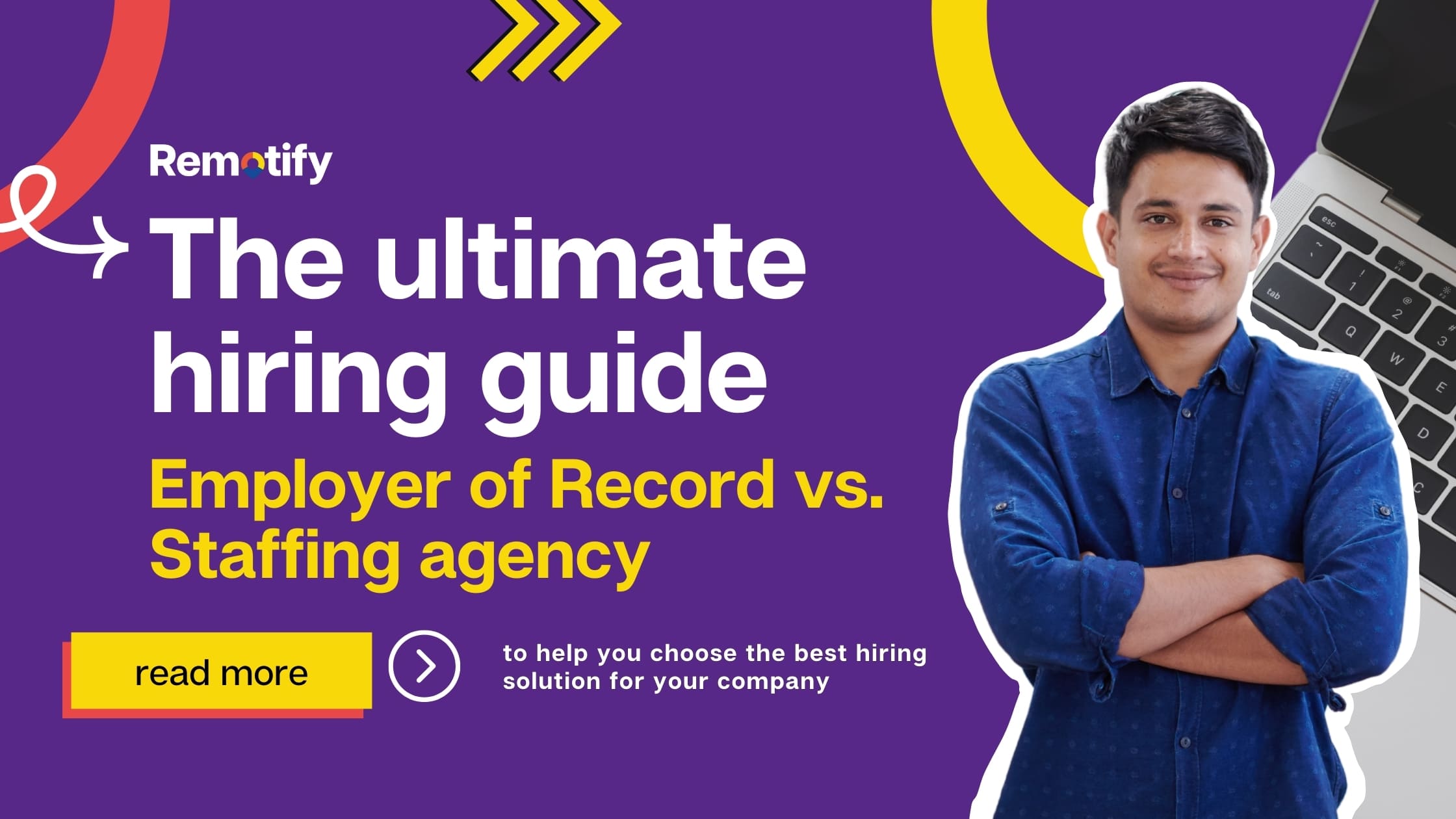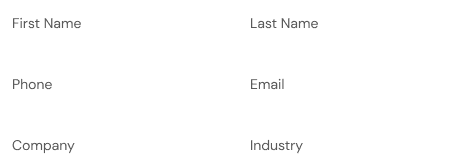
EOR vs. Staffing Agency: Your Ultimate Guide to Hiring Solutions
Hiring can be tough, whether you're running a business or working in HR. With the rise of remote work and an increasingly globalized workforce, there are now many ways you can find and manage talent. Two viable hiring solutions would be through an employer of record (EOR) service or a staffing agency.
While both EORs and staffing agencies can help businesses fill their workforce needs, they operate in different ways and offer distinct advantages. In this guide, we’ll take a closer look at the differences between the two services to help you determine which one is best suit for your needs.
What Is an Employer of Record?
An Employer of Record (EOR) is a third-party organization that takes on the formal employment responsibilities of workers on behalf of the employer. This includes legal, administrative, and HR tasks. Essentially, the EOR acts as the legal employer while you manage the day-to-day activities of your employees.
Key Functions of an EOR
- Payroll Management: Handles all aspects of payroll processing, including tax withholdings and benefits.
- Compliance: Ensures adherence to local labor laws, regulations and contributions, minimizing your legal risks and ensuring your operations run smoothly.
- Employee Benefits: Manages employee benefits such as health insurance, retirement plans, etc. according to both what you can offer and local mandated benefits.
- HR Support: Provides HR support and guidance for any employee-related issues or questions while also helping with performance assessment, training, etc.
What Are the Benefits of Using an EOR?
- Cost Reduction: Reduces administrative overhead and potential legal costs. Charges a fixed service rate depending on the number of employees involved.
- Risk Mitigation: Minimizes liability related to employment law and taxes.
- Saves Time: Without the need to focus on growing and sustaining your team, you would have more time to handle the essential needs of your business or other affairs.
- Focus on Core Activities: Allows you to concentrate on business growth and strategy instead of HR tasks.
- Global Reach: Facilitates international hiring without setting up foreign entities.
- Flexibility: Can be used for short-term projects or to test a new market without committing to a full-time employee.
What Is a Staffing Agency?
A staffing agency, also known as a recruitment agency, specializes in finding and placing temporary, contract, or permanent employees for your company. They handle the recruitment process from start to finish but do not take on the legal responsibilities of employment.
Key Functions of a Staffing Agency
- Recruitment: Sources and screens candidates to fill open positions.
- Shortlisting: Presents a list of qualified candidates for your consideration.
- Temporary Staffing: Provides temporary or contract workers for short-term projects.
- Skill Matching: Matches candidates' skills with your job requirements, ideal for specialized tasks.
- Saves Time: Reduces time needed for the recruitment process.
What Are the Benefits of Using a Staffing Agency?
- Quick Hiring: Speeds up the hiring process, especially for temporary or urgent positions and saves time.
- Access to Talent: Provides access to a pool of pre-screened candidates.
- Flexibility: Offers flexible staffing solutions to meet fluctuating business demands.
- Reduced Workload: Takes care of initial recruitment tasks, saving you time and effort.
Disadvantages of Using a Staffing Agency
- Higher Costs: Often comes with higher fees compared to EOR services because they charge a percentage of employee’s salary and/or fixed service fees per hire or recruitment
- Temporary Solutions: Primarily focuses on short-term staffing rather than long-term employment.
- Limited Control: Less control over the hiring process and the candidate's employment terms.
- Training and Onboarding: When recruiting with a staffing agency, added training and onboarding processes may be needed.
Key Differences Between an EOR and a Staffing Agency
| Feature | Employer of Record(EOR) | Staffing Agency |
| Employment Responsibility | Takes on legal responsibilities over your employees | Does not take on legal responsibilities over your employees |
| Functions/Services | Payroll Management, Legal Compliance, HR Management | Recruitment, Shortlisting, Temporary Staffing, Skill Matching |
| Employee Benefits | Manages Benefits | Typically does not manage Benefits |
| Cost | Varies from service to service, generally charges its services per number of employees involved. | Generally charges a percentage of the employee’s salary and/or fixed service fees per hire or recruitment |
| Control | Handles legal and regulatory compliances while you would still have control over your day-to-day operations | Does not handle legal and regulatory compliances and you have limited control over your temporary staff |
| Focus Staffing | Focuses on long-term employment, labor compliance | Focuses on short-term and temporary employment |
| Training and Onboarding | Typically handles training and onboarding needs | Does not handle training and onboarding needs |
In summary, EOR’s are more long-term and help you deal with the nuances of expanding your business and team while Staffing agencies are short-term and help you acquire manpower on a temporary basis. EOR’s have a more consistent charging system while Staffing Agency’s vary per hire.
Choosing the Right Solution for Your Business
Choosing between an EOR and a staffing agency depends on what your business needs. If you require long-term employment solutions with compliance and administrative support, an EOR might be the best fit. On the other hand, if you need quick, flexible staffing solutions for short-term projects, a staffing agency could be more suitable.
Partnering with Remotify
Understanding the nuances between an Employer of Record and a staffing agency can significantly impact your decision-making process. Each has its own set of benefits and drawbacks, and the right choice depends on your unique business needs.
If you're looking to expand your team in the Philippines both remotely and cost-effectively, partnering with an EOR in Philippines like Remotify is a great next step.
Navigating local tax and labor laws, compliant HR management, in-country capital requirements, payroll, and benefits can be time-consuming when expanding to different countries. However, with Remotify as your partner, your growth doesn’t have to be complicated. We're here to simplify the process for you.
With our Employer of Record service, we will take on the burden of managing local HR, compliance, attendance tracking, payroll, reporting, onboarding, etc. taking care of the heavy lifting for you. Allowing you to focus on what matters most: growing your business.
This enables you to quickly and securely hire employees in the Philippines, attract top talent while keeping them engaged without the hassle of managing your own entity.
FAQs
A. In what ways can an employer of record (EOR) assist companies in reducing costs?
An EOR reduces costs by handling payroll, benefits, and compliance, which minimizes administrative overhead and potential legal fees. Additionally, EORs often have established relationships with partners and organizations and can negotiate better rates for employee benefits.
B. How does utilizing an employer of record (EOR) help businesses mitigate liability?
By ensuring compliance with local labor laws and managing employee-related legal responsibilities, an EOR helps mitigate liability. This includes handling workers' compensation, unemployment insurance, and other compliances or employee-related needs and issues.
C. Are staffing agencies typically more costly than an employer of record (EOR) solution?
It depends, staffing agencies often come with higher relative fees due to their recruitment services and temporary staffing solutions. EORs typically have more consistent pricing, as they handle long-term employment and provide comprehensive support.
D. What industries benefit most from using an EOR?
Any industry that seeks to expand globally, such as tech, finance, healthcare, etc., benefit most from using an EOR. These industries often require specialized knowledge and experience to navigate local labor laws and regulations.
E. Are there any risks associated with using a staffing agency?
Risks include higher relative costs, limited control over temporary staff, and less focus on long-term employment solutions. Staffing agencies are short-term investments, more fit if you would want to hire a temporary workforce to handle a project or something of the like. The model of an EOR and a Staffing Agency differ this way.
Jump straight to a key chapter
Spending Too
Much Time
Onboarding?
your remote hiring in the
Philippines, excellently.
Say Goodbye to High Costs!
Request Your Free Consultation Today andSave a Massive 70% on Your Workforce!

Ready to thrive in a remote-first work environment?


